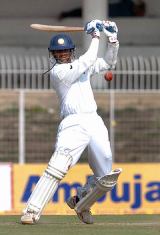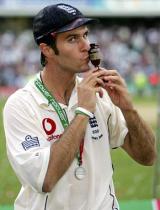
|

Rahul Dravid may be the most classical batsman today but at Nagpur he ended up as the bad guy
© Getty Images
|
|
Rahul Dravid is an outstanding cricketer, the most classical batsman in the world today. And he is one of the good guys - polite, modest and thoughtful. But at Nagpur, in a Test that had more twists than a racetrack, the biggest twist of all was that Dravid ended up playing the bad guy.
The match fluctuated in a way that was not so much ebb and flow as Jekyll and Hyde. It shaped as a rout, turned much more interesting, achieved perfect balance, went dull again, and then became briefly riveting, before finally falling flat. India have been widely praised for having a go at their steep fourth-innings target, and it was certainly fun watching Pathan and Dhoni throw the bat. But the acclaim doesn't quite add up. If you are going to applaud India for having a go, you have to rebuke them for not having a go before that. And the before lasted a lot longer than the after. India just didn't show enough urgency. Nor did Andrew Flintoff's bright young England, notably on the fourth evening, but they could plead inexperience.
The game had many quirks, led by the fact that it was an understudies' party. The centurions were a bridesmaid (Paul Collingwood), a new boy (Alastair Cook) and a prodigal son (Wasim Jaffer). Another nearly man, Mohammad Kaif, made nearly a hundred. You couldn't blame this lot for being circumspect, nor Anil Kumble, who is a tailender.
The only established batsmen to pass fifty were Kevin Pietersen and Dravid. Pietersen's 87 may have been assisted by outrageous fortune but he scored faster than all the above and imposed himself on the game. Dravid, by contrast, pootled along as if playing for his place, making
40 off 122 balls in the first innings and 46 off 161 up to tea on Sunday. England bowled well at him, Monty Panesar especially, but even so, 86 off 283, on a flat pitch against a depleted attack, is the sort of passive, boring, blinkered performance that cricket lovers of the past suffered for too long.
After tea, and perhaps a chat with Greg Chappell, Dravid was a changed man, switching to one-day mode and tripling his tempo. But it was too late. Captains are supposed to enable the other 10 players to do well, whereas Dravid had made a difficult task all but impossible. He had
committed the classic error, much favoured by old pros in England, of playing his normal game till the final session, then seeing if the chase was on, as if saving the game and winning it were two quite unrelated tasks. This was one of those days when, by playing their normal game, the batting side push their target out of reach. You could see the muddle India were in as they demoted Sachin Tendulkar, who then outpaced everyone else. How not to manage a run chase: delay entrance of best player.
"We thought we would give England a bit of a scare," Dravid said when asked about the sudden change of tack. He conceded that the dash could have begun 45 minutes earlier. Actually, it could have begun three hours earlier; then the scare would have been a major one. No doubt
Dravid will grow into the fine captain that Chappell sees in him, but this time he lacked the killer instinct. Sport is about grabbing your opportunities and neither captain quite had the confidence or experience to do it.

|

Winning the Ashes has its own pitfalls
© Getty Images
|
|
Curse of the urn
Michael Vaughan finds himself in a funny position. It's not just that he is sitting at home, playing with little Tallulah ("no you can't sit on my knee, darling"), reviewing his property portfolio, watching Sky and periodically texting Andrew Flintoff ("Blackie not lkg gr8. Whr supersub rule when need it?"). It's the fact that he hasn't won a Test since the Ashes, and now he won't have the chance for some time.
He is in distinguished company. England's last Ashes-winning captain, Mike Gatting, never won a Test again after that series in Australia in 1986-87. The one before was David Gower in 1985, and he never won another Test either, chalking up scores of 0-5 in the West Indies and 0-1 against India before being sacked in favour of Gatting, only to return, three years later, for a 0-4 drubbing by ... Australia.
The Ashes winner before that was Mike Brearley, master choreographer of
the famous 1981 series. He too never won another Test. But he has a
reasonable excuse: he retired from international cricket. And to be
fair to all these fine cricketers, the Ashes mean so much that many
England fans would regard never winning another Test as a price well
worth paying.
Tim de Lisle is a former editor of Wisden and now edits www.timdelisle.com

